Thank you for reading Beyond Survival, a publication about life after trauma. I’m planning essays on finding hope amidst the US Presidential election and hitting my latest Substack milestone (there are over 500 of you now!) Make sure you’re subscribed to get these essays in your inbox:
Growing up, I never thought I’d get married. The only vow I contemplated making was that I would never repeat my mother’s story. She got married in rural Ireland during the 1980s. The vast majority of her generation choose to marry. It was often the only path available to young women. Like many of her peers, my mother married, got pregnant and gave up her career to stay home rearing children
Back then, marriage was the only socially acceptable way to have children. Many women who became pregnant outside of marriage were imprisoned in institutions run by the Catholic Church. They were horrible places, full of violence and destitution. The women were forced to work for no or little pay, and their children were forcibly taken from them. Some were adopted overseas. Others died. Ireland made news internationally when a mass grave of babies and young children was found in the septic tank of a former institution in Tuam, County Galway. Rather than caring for young children, the religious orders running these institutions threw their dead bodies into a sewer. In total, about 35,000 women were imprisoned there. Roughly 6,000 babies and young children died1.
In today’s world, It’s hard to imagine the colossal shame of becoming pregnant outside of marriage. I grew up knowing the tragic story of Ann Lovett, a fifteen-year-old girl who died after giving birth in a church grotto. Ann was alone, lying on the ground in her school uniform as sheets of heavy rain fell around her. Her baby - a full-term, 6½ pound boy - was stillborn. Ann wrapped him in her coat and bled to death on the cold, January ground about 70km from the rural village where my mother grew up. A few months after Ann Lovett’s death, my mother got married. In her wedding photos, she isn’t smiling
Throughout my adolescence, I watched my mother struggle against the constraints of her marriage. She wanted to travel, to work, to live a bigger life. But that was never possible. I grew up in the shadow of her disappointments and vowed that I would never let myself become trapped in the gilded cage of other people’s expectations.
Then I met F.
It was June 2021 and I was slowly emerging from a dark, pandemic winter.
Our early dates were tremendous fun. We took long walks and cooked each other our favourite foods. F is Italian, and spoiled me with luxurious pastas and moreish aperitivo boards. I tried to woo her with the bread my mother used to make. Mam baked great slabs of brown soda bread on Sunday nights, inscribing each loaf with the sign of the cross. For my girlfriend, I made heart-shaped scones. I was falling for her.
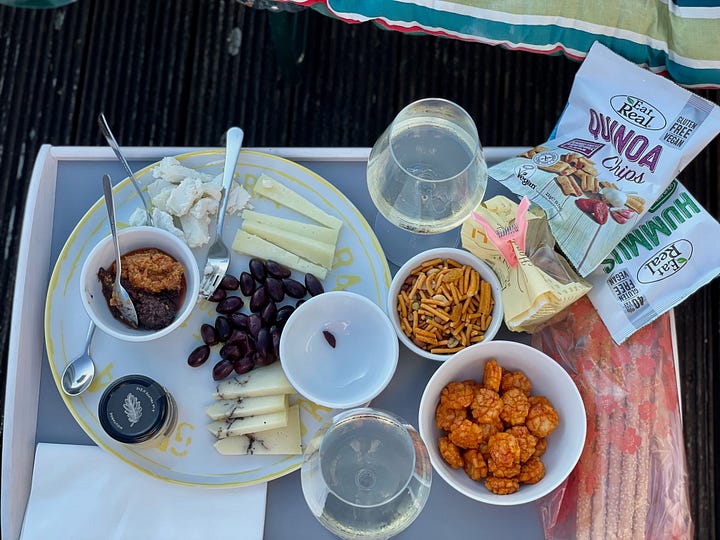
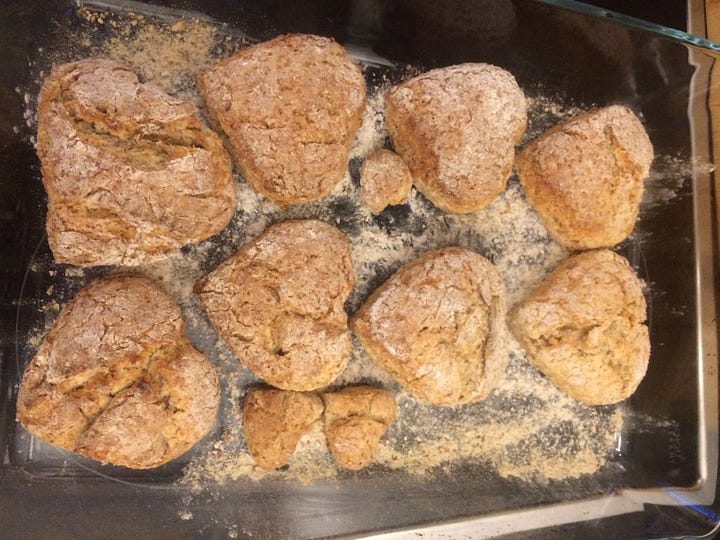
F introduced me to her cats: Budino, who had been her companion since she left Rome almost a decade before, and Martino, an Irish cat she’d adopted a few years before. Budino is a svelte Italian Signor with perfect posture and unreasonably high food standards, while Martino is more of a jokester. He drools when he’s happy, and likes to be chased around the apartment. Soon, I was learning Italian (mostly to communicate with the cats!) and spending more time at F’s place than my own.
Like any relationship, we had our challenges. Chastened by my mother’s experience, I treasured my independence. Recovering from childhood sexual abuse made me resilient, but also slow to ask for help. To a great extent, I’ve survived my traumas on my own, and I had very little muscle memory of how to live alongside another person. There was even a point about a year into our relationship when I told my therapist that, despite how much I loved F, I wasn’t sure that we’d be able to make a life together. I needed more space than she was able to give, and she wanted more closeness than I could manage. When things got hard between us, I pulled away. Or, I went towards her and tried to resolve the issue only to scamper back into myself when she started feeling better. I couldn’t restore myself alongside her and over time, it began to jeopardize our connection.
After weeks of friction and tearful fighting, we took our first holiday together. That trip changed everything for us. Every day, we went to a new beach where we rented sunbeds and took long swims in the sea. We read books, ate great food and just enjoyed being together. After weeks of tension, we stopped worrying about the rifts between us and focused on having a good time. We relaxed into each other, and made space for each other's idiosyncrasies. I didn’t get angry when she kept us up late throwing her flip flops at an errant mosquito, and she didn’t mind that I needed a little solo time each morning.
That trip was the beginning of a new rhythm between us. It was the first time we had found a way to both take care of ourselves and the relationship. No holiday is perfect, and this one had its share of tough moments. But whatever was happening around us, F & I were a team. We learned to keep each other close, while allowing each other space to process and experience the world differently. We stopped being two people battling over the opposing ideas of how a relationship should work, and became team-mates committed to partnership even when life was difficult.
After the holiday, F dropped me back to my place. I hugged her tight, and promised that I’d see her soon. Soon after she left, I realized that I didn’t want my own space anymore. I wanted to be with her. We decided to move in together. I remember crying in her arms one night after we’d packed up my old place. I had to grieve the home I’d made for myself - the first safe, secure home I ever had - but since moving in with F, I’ve never longed for it. I loved that chapter of my life, but I didn’t want it to continue. I wanted a partnership, a shared home and a shared life.
About a year after moving in together, I started thinking about marriage. F & I were on another holiday, driving through Sicily's mountainous middle. It rained a lot during that holiday, and the lackadaisical customer service really got on our nerves. But despite that aggravation, I couldn’t help daydreaming about spending the rest of my life with F. I tucked the thought away deep inside. It is too soon, I thought. It doesn’t make sense.
A few months later, our beloved elder cat Budino got very sick. F & I canceled our Christmas travel plans and devoted ourselves to caring for him. It seemed certain that Budino would soon be gone, and we struggled to find the most humane way to care for him through his final weeks. We went to the vet every second day and fretted over how little Budino was eating. I stank up our apartment heating fish in the microwave and hand fed him every few hours. F & I got sick too. I ended up in urgent care on Christmas Eve. I lost my voice and had to use AI Gwyneth to speak. It was cold and dark and miserable, but once again, F & I were a great team.
I made Mushroom Wellington and ordered a custom jigsaw puzzle of the cats’ faces. We watched movies on the couch, and quietly cried into our blankets. Our home felt gray with despair, but we stayed deeply connected. That grief-laden Christmas confirmed it. I wanted to spend the rest of my life with F. I didn’t know it then but F had started looking at engagement rings.
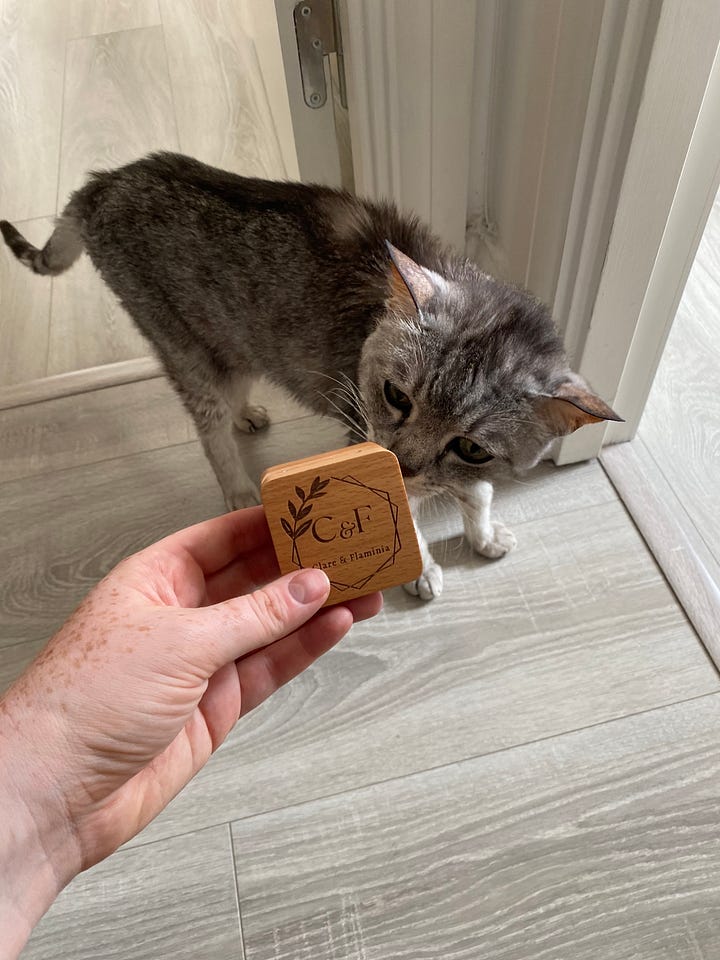
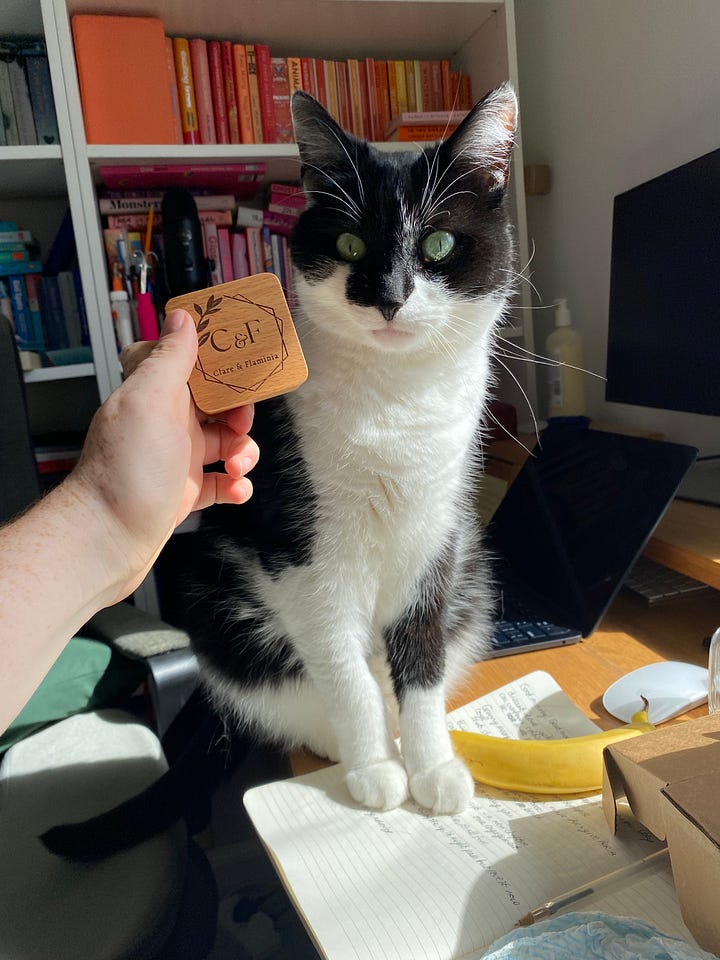
Earlier this summer, F and I each planned a romantic proposal. We tearfully shared our love and each had the opportunity to say “yes” to each other2. Our friends and family were thrilled for us. When I called my siblings, each answered the phone with a mild panic. We’ve learned that when the phone rings, something terrible might have happened. It was very sweet to be able to share some happy news instead. To be able to say that, to quote my sister, “I had found my person”.
I don’t want this to be an essay about how I was “damaged” and now I’m “cured.” That doesn’t feel right. It doesn’t feel like I was ‘rescued’ by my partner, though there is something special about feeling chosen. In all my flaws and messiness, F wants to be with me. I breathe with my mouth open. I am deeply introverted and need solo time to recover after socializing. I fart. I’m messy. I get sick a lot, and need help to get well. I work on difficult topics, and am still pretty bad at taking my rest. But F still chooses to be with me.
When she proposed, I cried and cried. I was so happy, but some part of me was also profoundly shocked that anyone could want to be with me. Some part of me still feels broken and unloveable. Somewhere deep inside, there’s an unquenchable well of worthlessness. Over the last few months, I’ve had to expand what I thought was possible. I’ve had to stretch to accommodate this joyous news. It’s a beautiful thing, but it hasn’t always been easy. I’ve felt grief, fear and anxiety as I found my way into this new chapter of life. But more than anything, I’m deeply, bottomlessly thrilled and delighted! I’ve felt dozens of small bolts of joy. Like the moment I opened the oven, took out a bubbling, moreish lasagne and realized: I’m gonna have amazing, home-cooked Italian food at home for the rest of my life.
A (happily married) friend once told me that the first year of a new relationship is often the most difficult. When you try to join two lives together, the friction it creates can be volatile and unpredictable. But if you can weather those storms, you can find a new equilibrium. You can find a way of living alongside each other and create something that is infinitely better than what came before.
It’s devastating that my mother isn’t here to share this happy time in my life. Her story didn’t have a happy ending. She suffered through more than a decade of legal strife before she finally got divorced. A few weeks later, she was killed in a car accident. Now 40 years after her wedding and 17 years after her divorce, F and I have decided to get married.
My experience will be different from my mother’s. For starters, I’ll be walking down the aisle with a woman, ten years after people in Ireland voted to allow gay marriage. I’m choosing marriage not because I have to, but because it feels like the best container for the love and partnership F & I share. Together, we are writing a new story based on choice and commitment. It’s a marriage that would have been unimaginable to my mother’s generation, where both brides have independent careers, incomes and ambitions. Chief among those ambitions is the desire to create a marriage where both people can thrive.
🙏I’m thrilled to be able to share this joyous news with you. Thank you for being here
💕If you enjoyed this piece, please tap the heart button. It helps other people find my work.
💬In the comments, I’m curious about your views on marriage. Do you think it’s a heteronormative trap? Or is it a precious gift? Let me know in the comments below!
💰If you find value in my work, please consider becoming a paid subscriber. For a few quid every month, you can make my career more sustainable.
If you enjoyed this essay, you might also appreciate:
If you’re interested in reading more about this horrific chapter of Irish history, Claire Keegan’s award-winning book ‘Small Things Like These’ is also a great starting point. A film based on the book will soon be released too.
This is something I think all couples should do regardless of gender. It's lovely to ask someone to marry you, and it's also lovely to be asked.









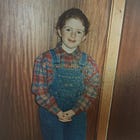

Congrats, Clare. What a heartrending story you share. I couldn't get over Ann, the 15-year-old who bled to death next to her stillborn baby--or the emboldened print that your mother was not smiling in her wedding photos.
My husband and I have been married for over 17 years. Marriage is hard. Every day is hard. The longer you are with one person, the more you have to reconfigure who you are as a couple, because you both change and grow throughout the years. I am not who I was when Ben and I married. He isn't, either. We never knew we'd have five children, never knew that one of them would be born with a rare craniofacial condition, that our families of origin would largely dismiss us and offer very little support.
I don't pretend that marriage is suitable for everyone or every romantic partnership. What I return to is this: I always saw myself as married, even when I was a little girl. And I am a fiercely loyal partner. Fidelity and commitment are vital to me. They mean everything, because of my trauma wounds of (emotional) abandonment. Sometimes I have to question when a relationship no longer serves me, or when I no longer serve that other person. In marriage, it's a starting over for me every day. It's getting up and trying to construct a new image of us, to readjust my expectations, to forgive gratuitously. Ben is getting there, too.
I guess I am saying all of this, because a lifelong relationship holds so much loss and gain inside of it that you can never predict or foresee or fully grasp. There is something good about permanence, though, I believe.
Congratulations Clare, I’m very happy for you! I mean, homemade lasagna for life? I’m a little jealous, but mostly very happy. Wishing you a lifetime of love.